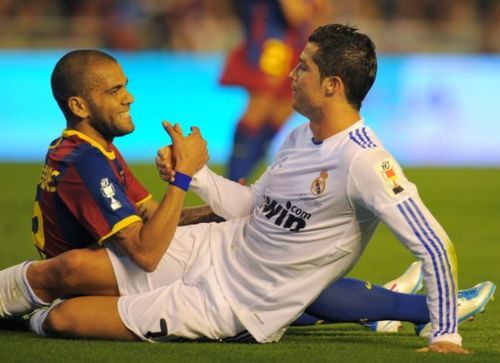Football, at its best, is a beautiful cabroncete
Football, at its best, is a beautiful cabroncete


By Eric Beard, writing from Barcelona
When 90 minutes were up and the whistle blew for extra time, time, for a moment, seemed suspended. Perhaps it was exhaustion, frustration, unbelievable pressure, or just two things wonderfully canceling one another out, but every player on the pitch in Valencia for the Copa del Rey had a moment of pure “what more can I do?”. Maybe it was Xavi finding a few inches time and time again only to find that Mourinho’s defensive shape was absolutely perfect. Maybe it was Pepe’s glorious header off the post or Dani Alves’ near-perfect performance making Mesut Ozil seem nothing more than malignant on the wing. Maybe it was Messi after being kicked by Xabi Alonso or Ronaldo not getting a few calls because of his reputation or Pedro seeing he was marginally offside moments after erupting into ecstasy. Every player will tell you that they cherished those minutes against their rivals, but at the same time those minutes were filled with the highest degree of irritation. But is all this angst, all this trepidation, simply football at its highest form?
With the wounds of being second-best still fresh, Dani Alves told the press, “It was worthy of a final. When you win you are content and when you don’t you are a little disappointed. Football is a little bastard ("cabroncete”) sometimes, but the good thing is that it does not stop and you must continue even if you receive a hard blow.“
On Wednesday night, Barcelona took the blow. Last November, Real Madrid took it. Eventually, with all the ups and downs, all the cups and second place finishes, it all comes back to square one. This game is not about thrashing your opponents every match, though admittedly that tends to be at least partially an effective motivational aim, at least for fans. José Mourinho knows better and it seems that Pep Guardiola does too.
It still is a bit much to say if Mourinho pulls off the ultimate feat by progressing to the Champions League final after the fourth Clásico that Barça will just let Mou and Madrid stand there on the pitch and bask in their glory. No, the sprinklers will almost certainly come on again. But now the rivalry has changed. Ignoring the tiki-taka beautiful football vs. catenaccio argument, there is nothing more absolute, more desired, and more joyous than to bask in a contest dominated by the concept of equality.
The equality may not linger for long, but at this point in time we are at a standstill. Barcelona has won the league, Real Madrid has won the Copa del Rey. 1-1. Game on. Without being familiar with anger, disappointment, and dissatisfaction, a player and even a fan, fails to know exactly why what they spend all their time caring about matters. The arrogance now reigns supreme in both ciudades, but respecting and acknowledging the capabilities of the opposition provides an El Clásico atmosphere we may never get to see again. Why? Because football is wonderfully cyclical, wonderfully filled with hope. Every August is a time to start over with a clean slate, however beneficial or preventative that truly is in reality.
Five clásicos in one season. Some have said it is too much. Some have said it will get boring. No, at this point in time we have reached an equilibrium that hasn’t been seen in Spain in years. The egos may remain, but the rivalry will rise to the context of the Champions League and evolve, forcing each individual to achieve a new level of mental strength, physical endurance, and perseverance. Undoubtedly throughout these matches there will be moments full of fans smashing their hands against their tables or closing their eyes begging for it to all go away. Likewise, players will slam the ground or kick the post in aggravation, not knowing how they can get through 180 minutes of this madness. We’re united by what we love, but also by what we hate. These emotions, embrace them, it’s what this game is all about.







